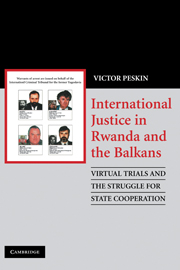 International Justice in Rwanda and the Balkans
International Justice in Rwanda and the Balkans Book contents
- Frontmatter
- Contents
- Maps and Timelines
- Acknowledgments
- Permissions
- Note on Pronunciation
- MAP 1 Map of the Former Yugoslavia
- MAP 2 Map of Rwanda
- PART I INTRODUCTION
- PART II THE BALKANS: STRATEGIES OF NON-COMPLIANCE AND INSTRUMENTS OF PRESSURE
- 2 Slobodan Milošević and the Politics of State Cooperation
- 3 International Justice and Serbia's Troubled Democratic Transition
- 4 Franjo Tuđman and the Politics of International Justice
- 5 The Politics of State Cooperation in Croatia's Democratic Era
- PART III RWANDA: VIRTUAL TRIALS, INTERNATIONAL JUSTICE, AND THE POLITICS OF SHAME
- PART IV CONCLUSION
- Bibliography
- Index
3 - International Justice and Serbia's Troubled Democratic Transition
Published online by Cambridge University Press: 05 September 2012
- Frontmatter
- Contents
- Maps and Timelines
- Acknowledgments
- Permissions
- Note on Pronunciation
- MAP 1 Map of the Former Yugoslavia
- MAP 2 Map of Rwanda
- PART I INTRODUCTION
- PART II THE BALKANS: STRATEGIES OF NON-COMPLIANCE AND INSTRUMENTS OF PRESSURE
- 2 Slobodan Milošević and the Politics of State Cooperation
- 3 International Justice and Serbia's Troubled Democratic Transition
- 4 Franjo Tuđman and the Politics of International Justice
- 5 The Politics of State Cooperation in Croatia's Democratic Era
- PART III RWANDA: VIRTUAL TRIALS, INTERNATIONAL JUSTICE, AND THE POLITICS OF SHAME
- PART IV CONCLUSION
- Bibliography
- Index
Summary
Introduction
Slobodan Milošević's fall from power on October 5, 2000, raised hopes in Serbia and at the International Criminal Tribunal for the Former Yugoslavia (ICTY) that a new era had dawned. For many Serbs, Milošević's loss in the national elections in late September and his decision – in the face of massive street protests and the loss of support from his elite police units – to finally abide by the election results meant a quick end to Serbia's international isolation and pariah status. With the embrace of electoral democracy, Serbia could now claim a rightful place in the international community. At the ICTY, Milošević's fall increased the prospects of state cooperation for the arrest and hand over of those Serb war crimes suspects who had long evaded the tribunal's reach.
As long as Milošević remained in power as president of the rump Yugoslavia, the tribunal expected and received little, if any, cooperation. The prospects for cooperation only grew worse following the tribunal's May 1999 indictment of Milošević and four senior Serb officials in connection with massacres in Kosovo. Without his removal from power, the tribunal's bid to prosecute Milošević and many other indicted war criminals would continue to be imperiled because many of these suspects were either Serb or Bosnian Serb citizens who enjoyed the protection of the Belgrade government.
The beginning of the democratic era in Fall 2000 marked a new chapter in the “trials of cooperation” between the Serbian government and the ICTY.
- Type
- Chapter
- Information
- International Justice in Rwanda and the BalkansVirtual Trials and the Struggle for State Cooperation, pp. 61 - 91Publisher: Cambridge University PressPrint publication year: 2008


